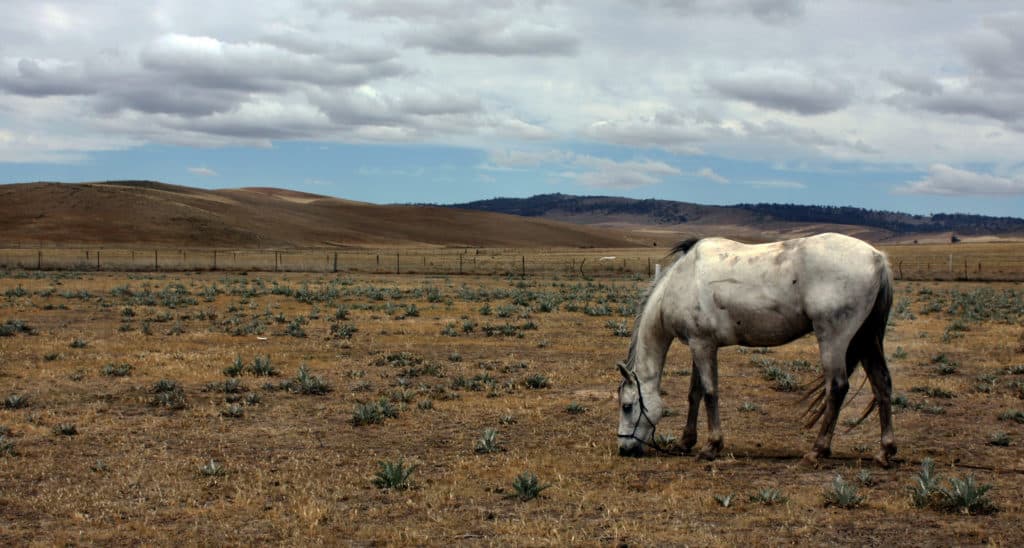Feeding Horses in Drought

Our thoughts are with all those doing it tough in drought-stricken areas and whilst we cannot make it rain, we can provide you with some tips on how to keep your horses healthy in drought conditions.
The two most important things when it comes to feeding horses in drought is providing clean water and enough roughage. Horses can consume up to 40-50L of water during summer and around 20-30L in winter (Relative to horses’ size and exercise). So where possible it is important that fresh, clean drinking water is provided at all times to your horse.
Why roughage is important for feeding horses in drought?
Horses need a minimum of 1% of their body weight each day to maintain gastrointestinal health, this means that for a 500kg horse, they need 5kg of roughage. In the wild horses would naturally graze for up to 18 hours per day, which in drought conditions can be almost impossible to achieve.
Providing ad lib access to hay is a good substitute for pasture during drought. Slow feeders are a great addition to your horse’s paddock as they allow your horse to graze hay in a naturally continuous manner that simulates pasture grazing. The chewing promoted through constant access to roughage causes an increase in saliva which contains bicarbonate and buffers the continual acid secretion within the stomach, reducing the risk of gastric ulcers which can significantly impact performance and body condition.
There are a number of different types of roughages for horses:
- Pasture
- Hay: Oaten, Wheaten, Lucerne, Meadow, Rye, Clover & Teff
- Chaff: Oaten, Wheaten & Lucerne
- Haylage
- Superfibres: Beet Pulp & Soy Hulls
Is my horse getting everything it needs?
For many horse owners, pasture can contribute significantly to their horse’s daily diet. It is there for important to consider
A. If your horses pasture availability has decreased and
B. Does your horses pasture still contain the level of nutrients that it did before the drought.
If you are unsure if your current feeding regime is meeting all of your horse’s requirements, Ranvet’s nutritionists are here to help. We offer a complementary Diet Evaluation Service to all of our customers. Our diet evaluation form takes approximately 5-10 minutes to complete. Once you have submitted your diet evaluation form, one of Ranvet’s qualified nutritionist will contact to you confirm all of the details. We will then provide you with a comprehensive report on your current feeding regime and tailored recommendations to suit your horse:
https://www.ranvet.com.au/nutrition-centre/diet-evaluation/
Not only do we ensure that your horses diet is balanced, we can also offer some advice of cost saving alternatives which can help reduce your feed bill.
Here are some simple steps that you can perform to preserve your pastures and to keep your horses healthy and happy in tough times:
- Buy hay in bulk if possible and before prices are due to increase.
- Store your hay in a dark and dry place to preserve the quality and longevity of it.
- Pool truck resources, so that a few people can share the truckload of hay and cost in logistics.
- Resting pastures should continue throughout the drought. During drought conditions, there may be very slow/minimum growth, it is important to rotate paddocks frequently as pastures are extra fragile in these conditions.
- Slow feeders/hay nets will stimulate the natural grazing behaviour whilst minimising wastage and the time it takes for your horse to eat their hay. This will also minimise the probability of your horse getting sand colic from eating off the ground (dry/sandy/dusty surfaces). It is also great for preventing ulcers as they will always have something in their stomach to act as a buffer as it helps mimic their natural grazing behaviours.
- Have a drought action plan! As the drought progresses, keep reassessing to ensure that you have the right measures in place to keep your horse healthy and happy.
- Weeds tend to follow the drought. Keeping on top of the weeds that come through will help your pastures recover fully.
- Slowly reintroduce your horse to grass. Young grasses are also low in the fibre that horses need and are high in soluble carbohydrates that can upset the sensitive microbe balance that exists in a horse’s hind gut. Caution should be used when turning horses out on pastures that are young and green as an alteration in gut flora, and high sugar content could trigger laminitis if this is not taken into consideration.
- Speak to a professional! Ranvet are here to answer any of your nutritional questions. You can call us Toll Free on: 1800 727 217. We are more than happy to give you some advice on cheaper feed alternatives and give you peace of mind that your horse’s diet is nutritionally balanced.
Finally, if you feel that you need help during these tough times, don’t be hesitant to ask for assistance, whether it be from local community or government based. Fundraisers may be of assistance during these testing times and weather conditions, to help those badly affected.
Experts in Equine Nutrition
Every product in the Ranvet range has been developed to meet a horse’s most specific need at any given time, be it in a training environment or on a breeding farm. Having pioneered the formulation of specific medications and dietary supplements for horses, the company is now recognised as a leader in the areas of equine health and nutrition.
